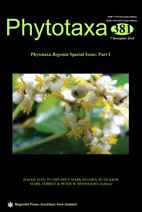Abstract
Begonia is a pan-tropical, mega-diverse genus of economic value as ornamental and medicinal plants. As the fifth largest genus in the angiosperms, Begonia has a huge diversity with over 1,900 known species, which are mainly distributed in the tropical regions of Asia, America and Africa. The size and distribution of the genus gives it the potential of becoming a model plant for genomic, biogeographic, systematic and evolutionary research. Begonia species are extremely sensitive to habitat, and most are locally endemic, with many of these being endangered. The wild species with particularly beautiful foliage or value as traditional medicine face excessive collection and illegal trade. In the past 20 years, the number of accepted species names in Begonia has increased considerably, from 1200 to 1900+. However, due to the micro-endemic nature of Begonia species and inadequate field surveys, many new taxa still await discovery and description. Furthermore, in order to provide up-to-date reliable data for scientific research, conservation and utilization, most previously described taxa deserve taxonomic revision. To address this knowledge shortfall, we proposed publishing a series of special issues on Begonia to present current advances in classical taxonomy, phylogeny, speciation, population genetics, biogeography, natural hybridization and conservation biology related to this genus.

